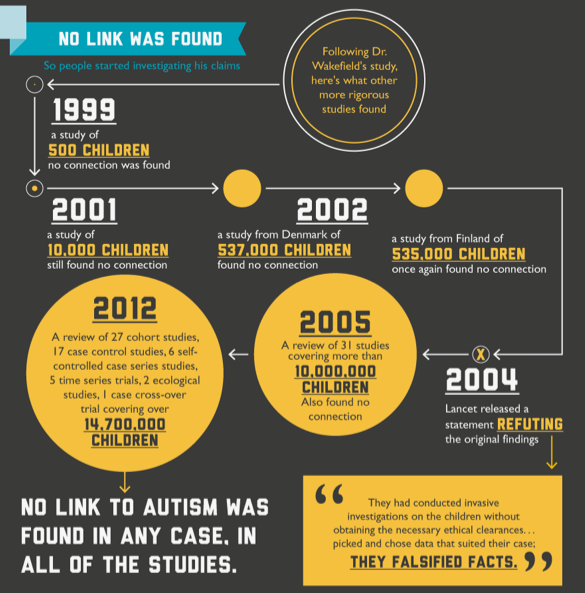HHS Investigation Into Debunked Autism-Vaccine Link Draws Criticism

Table of Contents
The Scientific Consensus Against an Autism-Vaccine Link
The assertion of a causal link between vaccines, particularly the MMR (measles, mumps, and rubella) vaccine, and autism has been repeatedly and comprehensively debunked. Decades of rigorous research have consistently failed to find any evidence supporting this claim.
Decades of Research
- Large-scale epidemiological studies: Numerous large-scale studies involving hundreds of thousands of children have consistently shown no association between MMR vaccination and autism spectrum disorder (ASD). These studies, conducted by reputable organizations worldwide, utilized robust methodologies and statistical analyses. Examples include studies published in the Lancet, which retracted a fraudulent paper that initially fueled the controversy.
- The role of the CDC and WHO: The Centers for Disease Control and Prevention (CDC) and the World Health Organization (WHO), along with other leading health organizations globally, have unequivocally stated that there is no link between vaccines and autism. Their conclusions are based on extensive reviews of available scientific evidence.
- Retraction of fraudulent studies: The infamous 1998 Lancet study by Andrew Wakefield, which falsely linked MMR vaccination to autism, has been completely retracted. Wakefield’s research was found to be fraudulent, unethical, and driven by conflicts of interest. This retraction underscores the importance of relying on peer-reviewed, reputable research.
Understanding the Misinformation
The misinformation surrounding the autism-vaccine link originated from several sources and continues to spread through various channels.
- Social media and anti-vaccine groups: Social media platforms, unfortunately, have become breeding grounds for the dissemination of misinformation. Anti-vaccine groups actively spread misleading claims and conspiracy theories, often exploiting parental anxieties.
- Misleading claims and their debunking: Common misleading claims often involve misinterpreted correlations, anecdotal evidence presented as scientific fact, and the deliberate misrepresentation of scientific findings. These claims are consistently refuted by the overwhelming body of scientific evidence.
- Confirmation bias and echo chambers: People tend to seek out and believe information that confirms their pre-existing beliefs, creating echo chambers where misinformation reinforces itself and becomes increasingly difficult to counter.
Criticisms of the HHS Investigation
The HHS investigation itself has faced significant criticism, raising concerns about its impact on public health.
Resource Allocation Concerns
Critics argue that resources dedicated to this investigation into a debunked theory are diverted from more pressing public health issues.
- Other public health needs: Funding could be better allocated to address crucial areas such as combating antibiotic resistance, improving access to healthcare for underserved communities, and tackling other infectious disease threats. The financial cost of this ongoing investigation, though not publicly detailed, is significant.
Perpetuation of Misinformation
Perhaps the most damaging criticism is that the investigation, regardless of its outcome, inadvertently legitimizes the debunked theory and further fuels vaccine hesitancy.
- Media coverage and public perception: The very act of conducting an investigation, even if based on prior flawed research, can give the false impression that the link between vaccines and autism is still a subject of legitimate scientific debate. This can significantly impact public perception and fuel vaccine hesitancy.
Lack of Transparency and Communication
Critics point to a lack of transparency in the investigation's methodology and communication of findings to the public.
- Public distrust: The perceived lack of openness regarding the investigation's process can erode public trust in government institutions and health authorities. Improved communication strategies are needed to actively counter misinformation and build public confidence.
The Impact of Vaccine Hesitancy on Public Health
Vaccine hesitancy has serious consequences, directly impacting public health.
Measles Outbreaks and Other Diseases
Declining vaccination rates have led to a resurgence of preventable diseases.
- Statistics on outbreaks: Measles outbreaks, in particular, have highlighted the dangers of vaccine hesitancy. Outbreaks have occurred in communities with low vaccination rates, resulting in significant morbidity and, in some cases, mortality.
The Importance of Herd Immunity
Herd immunity protects vulnerable populations, including infants too young to be vaccinated and those with compromised immune systems.
- Impact of low vaccination rates: When vaccination rates fall below a critical threshold, herd immunity is compromised, leaving vulnerable populations at increased risk of contracting and spreading infectious diseases.
Conclusion
The scientific consensus overwhelmingly refutes any link between vaccines and autism. The ongoing HHS investigation, despite its intentions, faces criticism for potentially diverting resources, legitimizing a debunked theory, and eroding public trust. The consequences of vaccine hesitancy are severe, leading to preventable outbreaks and jeopardizing herd immunity. We must rely on credible sources of information like the CDC and WHO, advocate for evidence-based public health policies, and actively combat the spread of misinformation related to the HHS investigation into the debunked autism-vaccine link. Vaccination remains a cornerstone of public health, crucial for protecting both individual and community well-being. Let's prioritize evidence-based information and ensure that everyone has access to accurate and reliable health advice.

Featured Posts
-
 German Wind And Solar Expansion Pne Group Receives Permits For Three Projects
Apr 27, 2025
German Wind And Solar Expansion Pne Group Receives Permits For Three Projects
Apr 27, 2025 -
 Planning A Happy Day For February 20 2025
Apr 27, 2025
Planning A Happy Day For February 20 2025
Apr 27, 2025 -
 Sources Reveal Hhss Controversial Choice For Autism Vaccine Study
Apr 27, 2025
Sources Reveal Hhss Controversial Choice For Autism Vaccine Study
Apr 27, 2025 -
 Ariana Biermann And Her Boyfriend Explore Alaska
Apr 27, 2025
Ariana Biermann And Her Boyfriend Explore Alaska
Apr 27, 2025 -
 Ariana Grandes Transformation Hair Tattoos And The Importance Of Professional Care
Apr 27, 2025
Ariana Grandes Transformation Hair Tattoos And The Importance Of Professional Care
Apr 27, 2025
Latest Posts
-
 The Broadcom V Mware Deal An Extreme Price Hike Of 1 050 For At And T
Apr 28, 2025
The Broadcom V Mware Deal An Extreme Price Hike Of 1 050 For At And T
Apr 28, 2025 -
 At And T Raises Alarm Over Extreme V Mware Price Hike After Broadcom Deal
Apr 28, 2025
At And T Raises Alarm Over Extreme V Mware Price Hike After Broadcom Deal
Apr 28, 2025 -
 Broadcoms V Mware Acquisition At And T Highlights Extreme Price Increase Concerns
Apr 28, 2025
Broadcoms V Mware Acquisition At And T Highlights Extreme Price Increase Concerns
Apr 28, 2025 -
 1 050 Price Hike At And T Challenges Broadcoms V Mware Acquisition Proposal
Apr 28, 2025
1 050 Price Hike At And T Challenges Broadcoms V Mware Acquisition Proposal
Apr 28, 2025 -
 Assessing The Us Economy The Immediate Effects Of A Canadian Travel Boycott
Apr 28, 2025
Assessing The Us Economy The Immediate Effects Of A Canadian Travel Boycott
Apr 28, 2025
